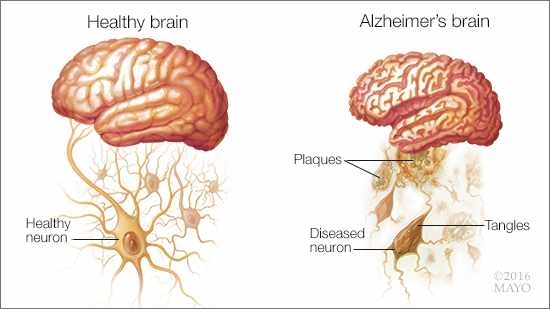Alzheimer's
"Would you like a drink?" your mother asks again. She does not seem to realize that she has asked twice before, but you are still waiting for your first cup of coffee. It reminds you of your grandmother, her own mother, when she started showing symptoms of Alzheimer's. So of course that raises questions. Is Alzheimer's hereditary? Are these the first Alzheimer's symptoms? Can you prevent Alzheimer's? At BeterKliniek, we are happy to help you find answers to these kinds of questions. In fact, we deal with heredity and prevention of all kinds of conditions, including Alzheimer's, on a daily basis.

What is Alzheimer's?
Alzheimer's is an incurable brain disease in which the cells in some parts of the brain stop functioning and die. At 70%, Alzheimer's disease is the most common form of dementia. It often begins insidiously with disturbances in memory. Researchers believe protein accumulations in the brain's nerve cells are the cause of Alzheimer's.
Is Alzheimer's hereditary?
In part, the risk of Alzheimer's is determined by an inherited component. The best-known gene that plays a role in this is the ApoE gene. This gene has three variants: ApoE2, ApoE3 and ApoE4. ApoE3 is most common, ApoE4 less common and ApoE2 significantly less common.
Carriers of the ApoE4 gene have a higher risk of Alzheimer's disease. In contrast, carriers of the rarer ApoE2 gene have a lower risk of the disease. In addition to the ApoE gene, there are other genes that hereditarily influence the risk of Alzheimer's. This makes it easy to tell from a DNA test whether you have an increased or decreased risk of developing Alzheimer's.
Cause Alzheimer's
Alzheimer's is characterized, among other things, by the accumulation of a sticky protein in the brain: the beta-amyloid. Whether these "amyloid plaques" have a function or are simply clumped garbage has been unclear until now.
Research shows that in as many as 70 percent of all vertebrates, part of the amino acid sequence is identical to that of the human beta-amyloid. According to the researchers, the conservation of the sequence suggests that the plaques not only cause damage but also have a useful function.
Previously, one of the researchers showed that beta-amyloid kills microbes. To test whether that's what plaques in the brain do, the team injected bacteria into the brains of mice. The next day, all the mice were found to have produced amyloid plaques. The results suggest that microbial infection stimulates the production of amyloid plaques.
Curse and blessing
Possibly, the brain responds to the invading pathogens by capturing and killing them with the beta-amyloid. But if the plaques are not cleared quickly enough, this can lead to inflammation and the entanglement of so-called tau proteins. Together, the inflammation and protein tangles lead to neuronal death and thus the progression of Alzheimer's disease. The stickiness of amyloid is thus both a curse and a blessing for an Alzheimer's patient.
"The results of this study are very important because they elucidate the link between amyloid and inflammation," said Brian Balin of the Philadelphia College of Osteopathic Medicine in Pennsylvania. Balin previously showed that protein accumulation could also be induced by infection with Chlamydia pneumoniae. Other research pointed to a role of Herpes in plaque formation. But until now, it remained unknown why accumulation occurs after infection.
The American researchers' hypothesis about plaques as a safety net for pathogens is supported by an MRI study at Maastricht University. Jacobus Jansen and colleagues found that the barrier between the blood and brain of patients, early in the disease process, is less strict than in healthy individuals. With a blood-brain barrier that is more permeable, pathogens can reach the brain more easily. "So the hypothesis that microbes play a role in Alzheimer's seems plausible to me," Jansen said.
Prevent
It is possible to take a DNA test at BeterKliniek to clarify whether you may be susceptible to developing Alzheimer's disease.
Stress, trauma and exorphins (natural morphins) from certain foods can be the cause of a:
- microscopic permeable gut (leuky gut) resulting in a blood-brain barrier that is more permeable (possible reason for getting Alzheimer's).
- immune system that is out of balance so microbes (possible reason for getting Alzheimer's) are not eliminated sufficiently.
- excess of the neurotransmitter glutamate (NMDA receptor problem) to which a pathogenetic role is attributed in acute and chronic brain disorders, such as hypoxia cerebri, stroke and Alzheimer's disease. Glutamate stimulates nerve cells in the brain, over stimulation leads to an influx of calcium, which is toxic to nerve cells.
An addition to the DNA test can be an exorphin urine test. Based on the results of the DNA test and/or the exorphin test, a preventive treatment plan can be developed for you.
Treatment
Our treatment involves restoring the endorphin system, NMDA (glutamate) receptor and mitochondria. We do this using dietary modifications, supplements, sometimes medication (including LDN) and Infusions with an NMDA antagonist, NAD+ or glutathione.
Treatment BeterKlinic
BeterKliniek is the clinic for Integrative Medicine that bridges regular and non-regular medicine.
An van Veen (physician) and Michael van Gils (therapist) look for the cause of a condition or disease. That is where the treatment starts otherwise, as people often say, it is 'carrying water to the sea'. We call this cause medicine. Sometimes it is also desirable to treat the symptoms (at the same time). We call this symptom medicine.
Chronic disorders often have their cause in epi- genetics. You can schedule a free informative telephone consultation (phone number 040-7117337 until 1 p.m.) at BeterKliniek to discuss your symptoms so that we can provide you with further advice.

